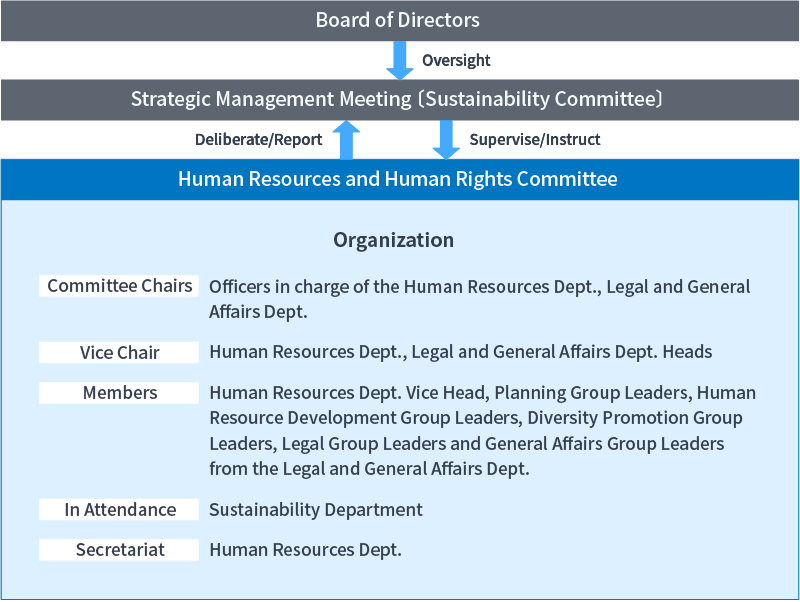Policy and Basic Mindset
UBE Group Basic Policy for Human Resources Management
In order to enhance corporate value and achieve the maximum well-being of employees, the UBE Group promotes diversity, equity and inclusion (DE&I), advances the empowerment of women, encourages the active participation of senior and foreign employees, promotes the employment of people with disabilities, and provides a rewarding workplace for all employees.
Aligned with our business strategy for the sustainable enhancement of corporate value, our human resources management strategy focuses on developing Talent Models that drive the specialty chemicals and on fostering employees capable of self-directed career development. We aim to build a corporate culture that fosters innovation.
Scope
This policy applies to the UBE Group (UBE Corporation and its consolidated subsidiaries). The human resources management strategy applies to UBE Corporation.
Goal
By enhancing diversity, we aim to build a corporate culture where people with various perspectives and experiences gather, demonstrate their abilities, revitalize the organization, and drive innovation. To achieve this, we will implement the following measures.
- We value the diversity of our human resources and respect the individuality of each person.
- We foster creativity and autonomy among employees and enhance motivation.
- We provide all employees with opportunities to develop professional skills.
- We aim for fair evaluation and remuneration.
- We will embrace diverse work styles and strive to maintain and improve an inclusive working environment.
Commitment
By 2030, we will achieve the following targets.
- Percentage of women in management positions (consolidated companies in Japan): 10%, Percentage of women in the workforce (consolidated companies in Japan): 25%
- Percentage of employees with disabilities (UBE Corporation, Libertas Co., Ltd., Ube General Service Co., Ltd.): 3.2%
- Investment in off-the-job training per person (UBE Corporation): 300,000 yen or more
- Employee turnover rate (UBE Corporation): 2% or less
- Percentage of male employees taking 20 days or more of childcare leave (UBE Corporation): 50%
Responsible Departments and Review
The Human Resources Department and Talent Strategy Department are responsible for overseeing and managing this policy.
This Policy is subject to regular review at least once every year. Any revisions, whether as part of a scheduled review or required during the fiscal year, will be deliberated and approved by the Human Resources and Human Rights Committee.
Basic Mindset Toward Our Talent Strategy to Promote Growth in Specialty Chemicals
1. Utilizing Our Talent Strategy in Tandem with Our Management Strategy
In the midst of a rapidly changing management environment, we must formulate and make use of a talent strategy that functions together with our management strategy to support a continued rise in corporate value.
To promote our growth into a corporate group centered on specialty chemicals, we have formulated a five-level talent strategy to undertake such initiatives. Under our current medium-term management plan, which corresponds to Level 3 of the talent strategy, we are developing high-level talent that can work to deepen our reforms to business structures and respond to sudden global developments. We are actively enacting measures to ensure these personnel can act in such cases.

2. Ten Personnel to Promote Growth in Specialty Chemicals
Under the previous Medium-Term Management Plan, we enacted entirely new initiatives to reform business structures and promote DX and evaluated our talent strategy with an eye to putting in place measures to maximize our utilization of human resources.
For instance, we engage in discussions on the development of proactive talent that will contribute to achieving the Company’s target of continuous growth in specialty chemicals. As such, we have defined a staffing model dubbed “Ten Personnel.” We will spread awareness of this model among employees in fiscal 2025.

3. Talent Management
Having introduced a talent management system, we have been able to create a visualization of our personnel contingent. Using this, we created a talent portfolio through interviews to determine the need for specific types of talent (the Ten Personnel) in each department within each business. This process has revealed the importance of effectively integrating development, hiring, and placement efforts to secure the optimal talent.
In addition, we are actively conducting internal recruiting with the aim of establishing career ownership, our core talent strategy. This approach provides opportunities for individual employees to consider their own careers while making career plans clearer through our conventional manager-led career development interviews as we conduct internal recruitment year-round.
Moreover, through efforts led by the DX Promotion Office that make full use of generative AI to improve operational efficiency and data usage, we will provide development opportunities for all staff to become digital talent. Our promotion of DX encompasses not only the use of digital technologies but the integration and streamlining of operations while bringing together technologies to create value. We are promoting DX across the Company from this perspective.
4. New Personnel System
We are reforming our personnel system with the aim of commencing operations in fiscal 2026. We strive to have staff consider their own personal growth and which of the previously defined Ten Personnel they aim to be as we build a framework to encourage autonomous career and specialist development. Specifically, we are unifying career-track employees and key employees without regard for age or educational background under a system that evaluates how they can best utilize their abilities when exercising their duties. We will also realize reforms by creating a framework for properly handling personnel who possess advanced specialties.





